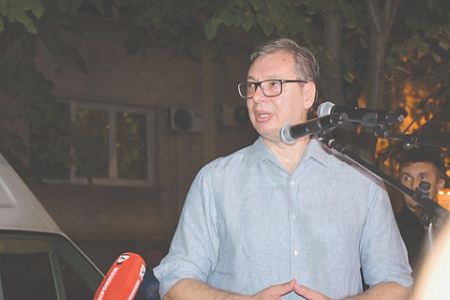
Serbian President Aleksandar Vučić has announced he will not amend the constitution to seek a third term, a declaration made as the nation grapples with over six months of sustained anti-government protests. While ruling out another presidential run, Vučić, a self-described “political veteran” now in his ninth year in power, has hinted at backing a chosen successor, raising questions about whether he intends to truly relinquish control or merely change his role within Serbia’s political landscape.
The current wave of unrest, which has united students and opposition parties, was ignited in November 2024 by the fatal collapse of a train station canopy in Novi Sad, which killed 16 people. The tragedy quickly became a symbol of systemic corruption, with protesters accusing Vučić’s government of negligence in state infrastructure projects. The demonstrations have since spread nationwide, expanding to include demands against the government’s perceived anti-democratic practices and authoritarian drift.
A significant source of public discontent is President Vučić’s foreign policy, which attempts to balance Serbia’s official goal of European Union membership with close ties to Russia and China. This balancing act has created friction with Brussels and stalled the country’s EU accession process, which began in 2009. Vučić’s attendance at the 80th anniversary Victory Day parade in Moscow this year drew sharp criticism from the European Commission, which warned it could further complicate membership negotiations, despite the President’s insistence that cooperation with Russia does not impede Serbia’s European future.
Amidst a deeply polarized society, the opposition is demanding early parliamentary elections, currently scheduled for late 2027. The political tension has recently spilled over into violence, with clashes breaking out between government supporters and opponents in several cities. While Vučić has not ruled out an early vote, he has also hinted at a political heir. “If I am to help someone who I believe can lead Serbia into the future, I will certainly fight for their success in the election,” he stated, without naming a candidate.
Analysts speculate that Vučić’s announcement may be a strategic maneuver rather than a full withdrawal from power. One prominent theory suggests he could transition to the role of prime minister, installing a loyalist in the presidency to maintain his influence. According to Yakov Smirnov, a researcher at the Russian Academy of Sciences’ Institute of Slavic Studies, this move would allow for a “nominal removal from the active management of the country” aimed at de-escalating public anger. Whether this strategy will succeed depends on Vučić’s ability to navigate the escalating protests that threaten to derail his plans for a managed political succession.
